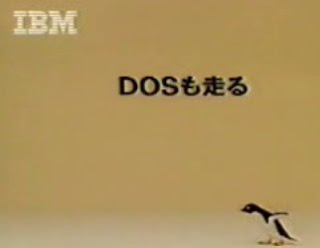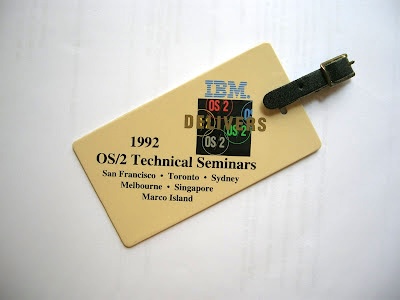Tux gets his break with OS/2
 Staying with my OS/2 reminiscence for a moment, there's a trove of old gems
up on YouTube (including the famous quote from Bill "we believe
OS/2 is the platform for the 90's").
Staying with my OS/2 reminiscence for a moment, there's a trove of old gems
up on YouTube (including the famous quote from Bill "we believe
OS/2 is the platform for the 90's").
While IBM ads in the US defied the limits of corny, in Japan
it is all so kawaii.
Of course! The correct way to market an operating system is with a TV star/model (Yamaguchi
Tomoko 山口智子), a bear and a penguin.
At least we know what Tux was up to before he got his
big break with Linux in 96...taking gigs playing "DOS" and living it up in Ropongi!
read more and comment..
Magician: Apprentice
Moving on to some fantasy after the hard sci-fi of Jupiter...
Magician: Apprentice
was Raymond E. Feist's bestselling
opener for his Riftwar Saga. First published in
1982, I read the 10th anniversary "author's preferred edition" (I gather that basically means he now has the
stature to override the original editor's cuts;-)
Fantasy isn't normally my preferred reading material, but I really enjoyed this. Sure the scale is epic, but
unlike Tolkien, Feist keeps the pace up and gory action a-plenty. And I'm looking forward to following Pug's
development as a magician. Unlike the fast-food, just-get-the-pronunciation-right approach of Harry Potter,
magic in this world is hard.
read more and comment..
Tough Choices
I've heard all the stories about Carly Fiorina from friends in HP - no doubt mangled, misquoted and somewhat
misogynistic. All the ills of the company were by her hand of course.
Always found that a bit much to swallow, so when I saw her autobiography
Touch Choices
on the
shelf I picked it up for a read.
I came away from the book with a much greater respect for the hard yards she has done to reach the top,
although her rise to the top is a somewhat charmed path within a few large corporates. Which may explain why -
although we get only one side of the story of course - she seems to have been so blindsided in the political
maneuvers that got her ousted from HP.
The book ends soon after her departure from HP, contemplating where to go next and what she really values in
life. And by then she had me won over; I think in truth a sincere, talented and hardworking person who really
cares for the people she leads.
read more and comment..
OS/2 Still Kicking..!?
I was pretty amazed to see IBM responding as recently as
16-Jan-2008 to the requests by the OS/2 online community to open source
OS/2.
I've admitted before to being an OS/2 fanatic for a
few years, but seriously, I think we should let it die and just savour the memories!
One of the great things about the OS/2 community way-back-when is that it was a total geek-out (memories of the
OS/2 Devcon in 1992 - still have the bag tag!). Linux has I think long taken that mantle.

It's a bit of a laugh to find some of my OS/2 detritus still kicking around the Internet, like:
-
- My article in EDM/2: REXX - The Developer's Best Friend
- A few tools still up in the os2 collection at hobbes:
-
- xeol for text file format conversion
- A Workplace Shell Command Shell Starter
- INISED - a utility to manipulate Windows-style profile (INI) files
- varc - Visual archive utility front-end, requires VREXX
- dsize - Display file/directory space usage on drives (REXX)
- shlong - Lists non-FAT names on an HPFS drive (REXX)
- .. mostly developed using REXX or my favourite compiler of the time: Borland C++ for OS/2!
I had fun with a couple of other projects that never made it to release (in both cases beaten to the post by the big boys. But dang it, no M&A windfalls in those days!):
- LNDW - Lotus Notes Doorway. I wrote a web server in C++ that provided gateway access to Lotus Notes database under OS/2. Tricky adaptation of the Notes C API to C++ and getting it to work with BC++. Then came Domino...
- OS2IP - a project with a long-lost collegue Bryan Ryan (if you are out there Bryan - drop me a line!). At the time, there was no free TCP/IP stack for OS/2 Warp, so we set about writing one. Got as far as an NDIS packet driver, and a user mode frame interface before IBM finally got their act together and made us obsolete! Nevertheless, good fun hacking around with the Driver Dev Kit in assembler, and bridging to a C++ user-mode API. I don't think it was until then that I really understood Comer in detail. When you are working at that level, it is amazing how exciting exchanging just a few bytes of data in a chat application can be!
read more and comment..